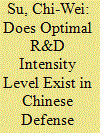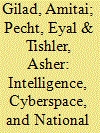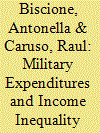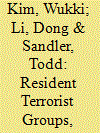|
|
|
Sort Order |
|
|
|
Items / Page
|
|
|
|
|
|
|
| Srl | Item |
| 1 |
ID:
177828


|
|
|
|
|
| Summary/Abstract |
This study explores the impact of geopolitical events on the stock return behavior of inter-Korean economic cooperation-related firms depending on the North Korean regime. We document empirical evidence showing that cross-sectional stock return tends to react positively to positive geopolitical events under the current regime in North Korea (Kim Jong-un), whereas negative geopolitical events have limited impact. Conversely, we find that negative geopolitical events yielded more pronounced effects on the stock returns of related firms under the former regime (Kim Jong-il). In addition, this study investigates the role of geopolitical shock in the evolution of aggregate economic variables of South Korea using Caldara and Iacoviello’s (2018) geopolitical risk index. Geopolitical shock is found to yield no statistically meaningful impact on stock price index, industrial output, employment, or gross trade volume. Furthermore, aggregate stock market variables are found to be immune to geopolitical shock in South Korea. These results indicate that market participants estimate the escalation of geopolitical risk into full-scale war as unlikely.
|
|
|
|
|
|
|
|
|
|
|
|
|
|
|
|
| 2 |
ID:
177830


|
|
|
|
|
| Summary/Abstract |
This paper investigates whether there exists an optimal level of research and development (R&D) intensity, at which defense enterprises are able to maximize their market performance. The Panel Threshold Regression Model was applied to probe the link between R&D intensity and sales growth for defense listed enterprises, in China. The empirical results indicate that the Law of Gibrat does not hold and, unlimited input in R&D, does not guarantee positive paybacks. This may lead to the assumption that there is an optimal R&D intensity level in Chinese defense enterprises. Due to the fact that the defense industry has broken entrance barriers and considering the introduction of social capital into R&D activities, managers and top management should set more specific guidelines and provisional benchmarks to ensure effective R&D resource allocation in order to achieve maximum performance.
|
|
|
|
|
|
|
|
|
|
|
|
|
|
|
|
| 3 |
ID:
177827


|
|
|
|
|
| Summary/Abstract |
This article assesses the spillover effects between terrorist activity and Spanish stock market returns for the period 1993–2017 . We construct a daily terror index that reflects the terrorist activity of different types of perpetrators: domestic terrorism (ETA) and international terrorism linked to Islamic extremism. Our static analysis shows that connectedness is important, as it explains about half of the forecast error variance; most of it is attributed to shocks from terrorist events on stock market return forecasts. Our dynamic analysis also uncovers an increase in spillover effects between the early period characterised by ETA terrorist attacks and the recent past characterised by Islamic terrorist attacks.
|
|
|
|
|
|
|
|
|
|
|
|
|
|
|
|
| 4 |
ID:
177824


|
|
|
|
|
| Summary/Abstract |
This study evaluates military intelligence as the process of data collection and knowledge development and assessment for decision-making by the military and other governmental agencies. We argue that dominance in modern warfare is enabled by human and technological intelligence that uncovers the rivals’ capabilities and intentions, increases the effectiveness of the country’s own weapon systems, and facilitates the development of high-quality defense systems. Hence, gathering and evaluating intelligence is essential for countries involved in conflict or exposed to terror threats. We focus here on the strategic and tactical implications of intelligence in the context of an arms and intelligence race between two rivals. We present and assess models that show how security agencies in countries in a state of conflict (with other countries and/or non-country entities) should invest in developing their own intelligence capabilities to ensure adequate military (security) capabilities, national security, and welfare. Since advanced cyber attackers can infiltrate almost all complex computer networks to gather intelligence (and/or cause other harms), we show how countries can establish procedures and determine the budgets to optimally allocate cyber-defense resources to prevent harmful cyber-attacks on the complex computer networks that manage their infrastructure, business, security, and government operations.
|
|
|
|
|
|
|
|
|
|
|
|
|
|
|
|
| 5 |
ID:
177826


|
|
|
|
|
| Summary/Abstract |
This paper contributes to the literature on military spending by analyzing the relationship between military spending and income inequality in a panel of transition economies over the period 1990–2015. In particular, we exploit three different measures of military expenditures: (i) military spending in absolute terms; (ii) military expenditures per capita; (iii) military burden, namely the ratio between military expenditure and GDP. Findings highlight a positive relationship between military expenditures and income inequality captured by means of three different measures of inequality. Results are also confirmed after we performed a variety of robustness tests. Other results are worth noting and somehow puzzling. For example, military conscription appears to have a redistributional effect and when considering a non-linearity the results show that there could be a concave relationship between military spending and income inequality. In addition, when testing for the ‘crowding-out argument’ results show that expenditures for subsidies are negatively influenced by military spending so confirming the crowding-out argument but there is no significant evidence when considering education and health expenditures.
|
|
|
|
|
|
|
|
|
|
|
|
|
|
|
|
| 6 |
ID:
177823


|
|
|
|
|
| Summary/Abstract |
This paper revisits moral hazard associated with military aid given to host countries to eliminate their resident terrorist groups. This conflict aid presents recipient countries with perverse incentives because the aid ends once resident groups are removed. In the case of US aid recipients, the longevity of resident terrorist groups rose dramatically. The current article improves on the empirics of the pioneering article by showing that the moral-hazard concerns extend to other major donors – the United Kingdom, France, and Germany. Additionally, military assistance given by a collective of countries to host countries greatly reduces the moral hazard but does not eliminate it. Moreover, policy alignment or affinity between a major donor and the host aid-recipient country does not generally augment resident terrorist groups’ survival, except marginally for the United States, when other sources of military aid are allowed. We introduce other empirical and conceptual innovations for analyzing military-aid-induced moral hazard.
|
|
|
|
|
|
|
|
|
|
|
|
|
|
|
|
|
|
|
|
|